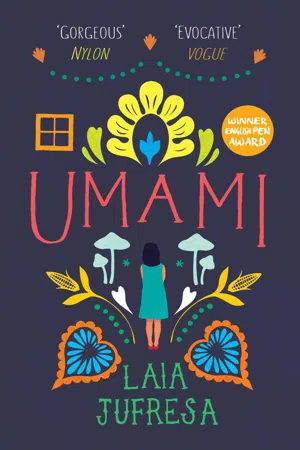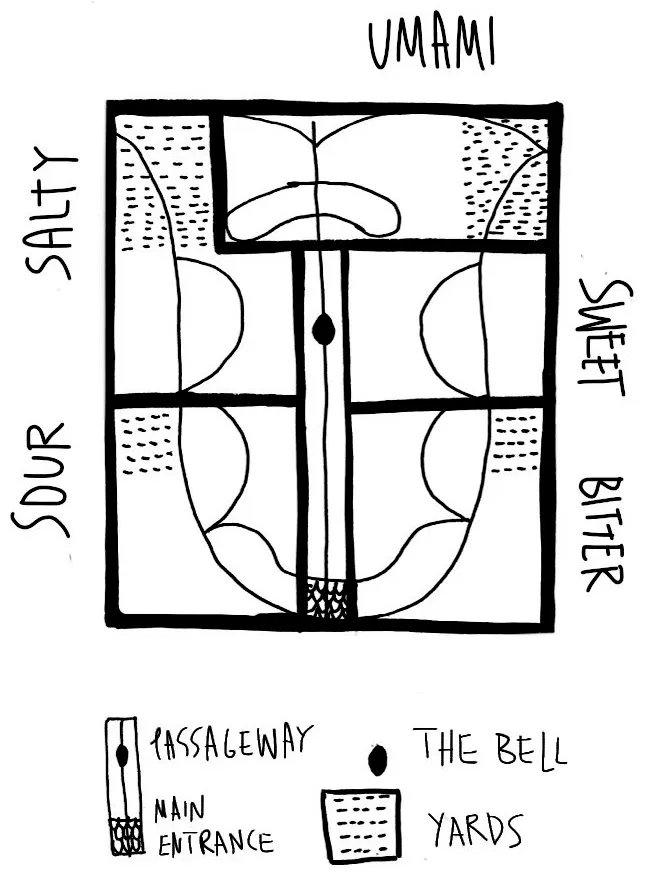
- 240 pages
- English
- ePUB (mobile friendly)
- Available on iOS & Android
eBook - ePub
About this book
'A wonderfully surprising novel, powered by wit, exuberance and nostalgia.' Chloe Aridjis, author of Sea Monsters
A captivating portrait of contemporary Mexico, cut through with dazzling wit and sensitivity
It started with a drowning.
Deep in the heart of Mexico City, where five houses cluster around a sun-drenched courtyard, lives Ana, a precocious twelve-year-old still coming to terms with the mysterious death of her little sister years earlier. Over the rainy, smoggy summer she decides to plant a vegetable garden in the courtyard, and as she digs the ground and plants her seeds, her neighbors in turn delve into their past. As the ripple effects of grief, childlessness, illness and displacement saturate their stories, secrets seep out and questions emerge – Who was my wife? Why did my mom leave? Can I turn back the clock? And how could a girl who knew how to swim drown?
Using five voices to tell the singular story of life in an inner city mews, Umami is a quietly devastating novel of missed encounters, missed opportunities, missed people, and those who are left behind. Compassionate, surprising, funny and inventive, it deftly unpicks their stories to offer a darkly comic portrait of contemporary Mexico, as whimsical as it is heart-wrenching.
A captivating portrait of contemporary Mexico, cut through with dazzling wit and sensitivity
It started with a drowning.
Deep in the heart of Mexico City, where five houses cluster around a sun-drenched courtyard, lives Ana, a precocious twelve-year-old still coming to terms with the mysterious death of her little sister years earlier. Over the rainy, smoggy summer she decides to plant a vegetable garden in the courtyard, and as she digs the ground and plants her seeds, her neighbors in turn delve into their past. As the ripple effects of grief, childlessness, illness and displacement saturate their stories, secrets seep out and questions emerge – Who was my wife? Why did my mom leave? Can I turn back the clock? And how could a girl who knew how to swim drown?
Using five voices to tell the singular story of life in an inner city mews, Umami is a quietly devastating novel of missed encounters, missed opportunities, missed people, and those who are left behind. Compassionate, surprising, funny and inventive, it deftly unpicks their stories to offer a darkly comic portrait of contemporary Mexico, as whimsical as it is heart-wrenching.
Tools to learn more effectively

Saving Books

Keyword Search

Annotating Text

Listen to it instead
Information


A Oneworld book
First published in North America, Great Britain and Australia
by Oneworld Publications, 2016
by Oneworld Publications, 2016
This ebook published by Oneworld Publications, 2016
Originally published in Spanish as Umami
by Penguin Random House Grupo Editorial, 2015
by Penguin Random House Grupo Editorial, 2015
Copyright © Laia Jufresa, 2014
Translation copyright © Sophie Hughes, 2016
Published by arrangement with VicLit Agency
Translation copyright © Sophie Hughes, 2016
Published by arrangement with VicLit Agency
The moral right of Laia Jufresa to be identified as the Author of this work has been asserted by her in accordance with the Copyright, Designs and Patents Act 1988
This is a work of fiction. Names, characters, places, and incidents are either the product of the author’s imagination or are used fictitiously, and any resemblance to actual persons, living or dead, businesses, companies, events or locales is entirely coincidental.
All rights reserved
Copyright under Berne Convention
A CIP record for this title is available from the British Library
Copyright under Berne Convention
A CIP record for this title is available from the British Library
ISBN 978-1-78074-891-7
ISBN 978-1-78074-893-1 (eBook)
ISBN 978-1-78074-893-1 (eBook)
This book has been selected to receive financial assistance from English PEN’s PEN Translates! programme. English PEN exists to promote literature and our understanding of it, to uphold writers’ freedoms around the world, to campaign against the persecution and imprisonment of writers for stating their views, and to promote the friendly cooperation of writers and the free exchange of ideas. www.englishpen.org

Typesetting and ebook by Tetragon, London
Oneworld Publications
10 Bloomsbury Street
London WC1B 3SR
England
10 Bloomsbury Street
London WC1B 3SR
England

Contents
- Part I
- 2004
- 2003
- 2002
- 2001
- 2000
- Part II
- 2004
- 2003
- 2002
- 2001
- 2000
- Part III
- 2004
- 2003
- 2002
- 2001
- 2000
- Part IV
- 2004
- 2003
- 2002
- 2001
For Tod, por todo
If poetry could truly tell it backwards,
Then it would.
Then it would.
– Carol Ann Duffy

I
2004
‘A milpa,’ I said.
I stood up on my chair in the dining room and said, ‘A proper, traditional milpa, with corn and beans and squash. I could plant it myself, right next to the picnic table.’
I drew a great circle in the air with my hands and proclaimed, ‘Like our forefathers.’
The three of us looked out of the sliding door to the yard where the picnic table lives. Once upon a time it was folding and portable. The benches on either side slot underneath like the retracting feet of a turtle, and the whole thing transformed into a neat aluminum travel case. Not anymore. It’d probably still fold up, but no one seems keen on picnics these days. Around the table there’s just gray cement (dirty gray), and a row of flowerpots full of dry soil, the remains of some bushes, a broken bucket. It’s a colorless, urban yard. If you spot something green, it’s moss you’re looking at; something red and it’ll be rust.
‘And herbs,’ I told them. ‘Parsley, cilantro, tomatillos, and chili for the green salsa Dad makes when we have people over.’
Dad bought into the idea straight away. He asked for some of those knobby tomatoes he once ate on tour in California. But Mom, the one who supposedly loves plants, wasn’t having any of it. She went to her room before I’d even got off the chair, and only agreed to the deal three days later. We wrote the full agreement on a napkin, then signed it, making one small change to appeal to Mom’s gringo sensibility: ‘a milpa with some grass on it’. A milpa-garden, if you will. There’s a history of milpas in our little development, Belldrop Mews. I’m not the first to try it. But anyway, now it’s official: ‘In exchange for plowing, planting, and tending the yard, Ana is excused from summer camp and may spend her vacation at home.’
My own home, I might add. Doesn’t this essentially mean I’m paying rent? Other people might see it that way. Not my parents. They’re really into fair trade. Fair trade and nature. Mom grew up next to a lake. She gets nostalgic about dragonflies.
In Mom’s head, summer camp = privileged childhood. But in this case camp is just a coded way of saying that my siblings and I spend two months with her stepmother, Grandma Emma, swimming among the weeds and feeding pebbles to the ducks in the lake by her house. Mom equates a passion for these kinds of activities with a healthy constitution; something like drinking a glass of milk a day or waking up with the birds. She brought us up in Mexico City, and yet she doesn’t want us to be city-kids, which is exactly what we are. She’s been living here twenty years and still ties a hippie scarf around her head: her personal take on the national flags other expats hang from their windows. Uprooted. This is how Mom refers to herself when we have visitors and she’s drinking red wine and her teeth and tongue start turning black. When I was little, I imagined wiry roots growing out of her feet, filling her bed with soil.
Protestant is another way Mom describes herself. And the word comes with a specific gesture: a slow flick of her wrist, a kind of curtsey of the hand; as much to defend as to mock herself. Within the family the mere gesture has come to mean Protestant. It’s our way of laughing at Mom’s neuroses: for a job well done; for punctuality. When someone flicks their wrist it’s like they’re dusting off the invisible cobwebs of Mexico’s Catholicism. Or it means it’s time to go to the airport, even if it’s too early. No matter who does it, the rest of us will translate the wrist-flick as ‘Behold, the Protestant ethic.’
The truth is there’s a Walmart next to her childhood lake now. But it’s not wise to bring that up. Neither that nor the suggestion that she too could go visit Emma. Mom tends to forget that the uprooting was her own doing. Sometimes I think I should do the same. Pack my things and get out of here the moment I hit fourteen. But I won’t, because she would just love that: her eldest daughter following in her footsteps. That’d be the family’s interpretation, no doubt about it. Mom twists things with the same firm delicacy she uses to fold our clothes and wring out the mop. I’ve seen pictures of her from when she was fifteen, with her cello between her legs and no shoes on. It was easy to vanish when you looked like that. Easy to float up and away. When I sit down my thighs meet, and there’s always something spilling out from the waistband of my pants, or my chair, or my mouth. And I’m a lost cause when it comes to rhythm. Same with adventures. I suspect if I ever ran away, I’d only end up coming back.
*
Now we have two sacks of ‘optimized’ soil. The owner of the garden center convinced me that our soil, the stuff that’s already there in the yard, won’t do. He told us it’s contaminated with lead. He told us that throughout the whole of Cuauhtémoc, the whole of Benito Juárez, and the whole of the city center, there are 1,300 micrograms of lead for every kilo of soil. I’m not sure I believe him, but in any case I bought some of his. Really I bought it so that my best friend Pina and I could get the heck out of there. He didn’t stare at our titties or anything, but he did sink his hands slowly into the sack of soil, all the way up to his forearm, while lecturing us about terrains and fertilizers. At that point, Pina, who’d only come on the condition that I buy her a half-liter of horchata afterward, dug her elbow into me.
‘Buy the soil,’ she said. ‘There’s enough shit in our tuna already.’
After we left, we hung out at La Michoacana, an establishment that by all appearances survives solely off our business.
‘You think he was a pervert?’ I asked Pina.
Pi licked her lips, stroked one of the sacks and moaned, ‘Mm, soil.’
Then she put her hand between her legs.
‘Mm, a little lead worm!’
Sometimes I truly resent having to be seen with her in public. The rest of the time I just feel jealous. I don’t know how to say no to Pina. When we were in fourth grade she made me play a game where you scratched your hand until it bled. Then we did a blood pact to be sisters. But lately we’re not so similar: everything she does, everything that happens to her, makes me jealous. It’s all so much more exciting than anything going on in my life. And I don’t know when this started. Actually, I do. It started when her mom reappeared. Before that we each had our own ghost: she had her mom and I had my sister. But three months ago her ghost contacted her online. It’s not the same, obviously, your mother leaving or your sister dying. But what’s worse: a mother that reappears out of nowhere, or one that never leaves the house?
Pina has stopped moaning.
‘Don’t say “pervert”,’ she says.
‘Why not?’
‘It’s what assholes call gay people. It’s a discrimatry word.’
‘Discriminatory.’
‘Whatever.’
*
‘Shall I just throw the new soil on top of the old soil and forget about it?’
We’re in my yard. Pina’s got one arm raised, with her head turned in toward her armpit. With the help of some tweezers, which she’s holding in the other hand, she slow...
Table of contents
- I
- II
- III
- IV
Frequently asked questions
Yes, you can cancel anytime from the Subscription tab in your account settings on the Perlego website. Your subscription will stay active until the end of your current billing period. Learn how to cancel your subscription
No, books cannot be downloaded as external files, such as PDFs, for use outside of Perlego. However, you can download books within the Perlego app for offline reading on mobile or tablet. Learn how to download books offline
Perlego offers two plans: Essential and Complete
- Essential is ideal for learners and professionals who enjoy exploring a wide range of subjects. Access the Essential Library with 800,000+ trusted titles and best-sellers across business, personal growth, and the humanities. Includes unlimited reading time and Standard Read Aloud voice.
- Complete: Perfect for advanced learners and researchers needing full, unrestricted access. Unlock 1.4M+ books across hundreds of subjects, including academic and specialized titles. The Complete Plan also includes advanced features like Premium Read Aloud and Research Assistant.
We are an online textbook subscription service, where you can get access to an entire online library for less than the price of a single book per month. With over 1 million books across 990+ topics, we’ve got you covered! Learn about our mission
Look out for the read-aloud symbol on your next book to see if you can listen to it. The read-aloud tool reads text aloud for you, highlighting the text as it is being read. You can pause it, speed it up and slow it down. Learn more about Read Aloud
Yes! You can use the Perlego app on both iOS and Android devices to read anytime, anywhere — even offline. Perfect for commutes or when you’re on the go.
Please note we cannot support devices running on iOS 13 and Android 7 or earlier. Learn more about using the app
Please note we cannot support devices running on iOS 13 and Android 7 or earlier. Learn more about using the app
Yes, you can access Umami by Laia Jufresa, Sophie Hughes in PDF and/or ePUB format, as well as other popular books in Literature & Literature General. We have over one million books available in our catalogue for you to explore.